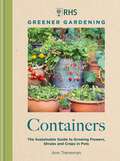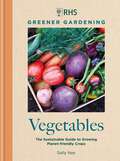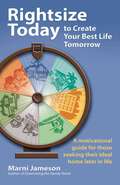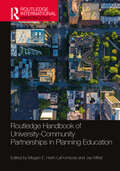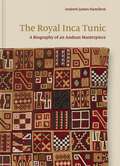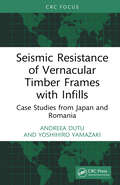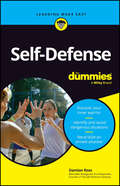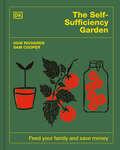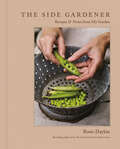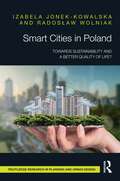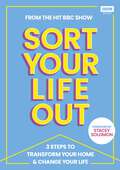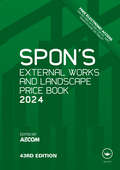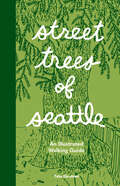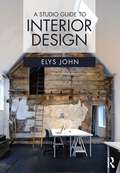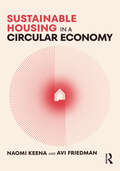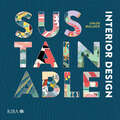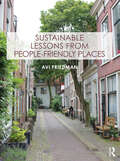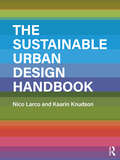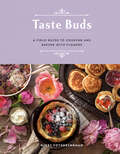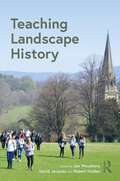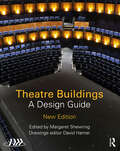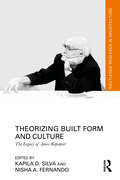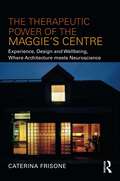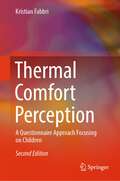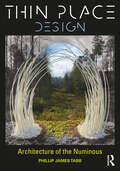- Table View
- List View
RHS Greener Gardening: the sustainable guide to growing flowers, shurbs and crops in pots
by Ann Treneman Royal Horticultural SocietyThis complete primer on how to make an eco-friendly container garden is dedicated to showing that everyone can have a garden, no matter the size, that can benefit the planet.RHS Greener Gardening: Containers guides you through greener choices when it comes to creating a container garden including materials, design, plant choice and maintenance. A few pots on the patio or a window box can become a dynamic mini eco system. A balcony garden can attract wildlife. With the right plants to choose from, a patio can hold an orchard. It's all a matter of 'thinking green', using recycled materials when possible, being wildlife-friendly, choosing plants that will avoid waste, and gardening sustainably.Featuring an easy-to-follow guide to green techniques as well as a helpful series of plant profiles, this is the perfect handbook for a sustainable container garden. Sections include:- Setting up your container garden- Container gardening techniques: sourcing plants, containers & contents, watering, feeding & troubleshooting- Creating containers: growing in groups, choosing a theme, how to create a map or a plan
RHS Greener Gardening: The sustainable guide to growing planet-friendly crops
by Sally Nex Royal Horticultural SocietyBuild your vegetable garden on sustainable, eco-friendly foundations from the start with this new guide to growing your own fresh, organic food. Greener Gardening: Vegetables is the perfect handbook for all seasons, helping budding and experienced gardeners alike in their journey towards a greener way of gardening. The book covers:- Setting up a new vegetable garden so it works hard for you and the environment- A wide ranging directory of vegetables organized by harvesting season- Methods for sowing and growing, plus advice on troubleshooting and saving seed- 'Tasks to do' reminders for keeping on top of garden maintenance each season- 'Do It Greener' reminders of quick and easy way to get greener results You will find new ideas on every page to keep your garden productive and sustainable for years to come.
Rightsize Today to Create Your Best Life Tomorrow: A Motivational Guide for Those Seeking Their Ideal Home Later in Life
by Marni JamesonA gentle guide for helping readers &“over a certain age&” discover their best life by finding the right-sized home in the best location.Moving is no fun. Neither is getting rid of stuff. And both jobs get harder as we get older. So, when those over a certain age — say, in the last third of life — are looking to downsize and move all at the same time, many will conclude, &“I&’ll just stay put, thank you very much.&” It&’s not just the acquired possessions holding them back, but also the intangibles. Their memories, their family history, their identities are all in jeopardy, they think. And yet, that reluctance to lighten up, let go, and move on is commonly all that stands between them and a better life. Rightsize Today to Create Your Best Life Tomorrow will help this group of root-bound home dwellers cross the bridge between stuck in the past and a lighter, better future. It will encourage them to embrace the fact that now, when they&’re no longer tethered to a school system or to a job they need to be near, is their chance to live where they want to live. Every section contains checklists: some soul-searching (should you or shouldn&’t you move?), some practical (what every kitchen must have), and some logistical (where&’s your happy place?), to help readers on their journey. Included are enlightening profiles of those who proactively changed their housing in the last third of their life. Whether they moved to a smaller place, remodeled their existing home, or even moved to a larger home, which one third do; whether they moved to a new city, to a senior community, or to a new home in the same neighborhood, they all reimagined their lives, re-evaluated their belongings and made a move toward a better and possibly their best life yet. To live your best life now requires an honest appraisal of who you are and who you&’re becoming, where you are in your life and where you&’re going or want to go. This book is designed to help those who are stuck explore what&’s holding them back, and provide them with the insights, experiences, and courage to move forward.
Routledge Handbook of University-Community Partnerships in Planning Education (Routledge International Handbooks)
by Heim LaFrombois, Megan E. Jay MittalThis handbook explores two guiding questions – how can university-community partnerships in planning education work, and how can they be transformative? University-community partnerships – often referred to as service-learning or community-engaged teaching and learning – are traditionally based on a collaborative relationship between an academic partner and a community-based partner, in which students from the academic partner work within the community on a project. Transformational approaches to university-community partnerships are approaches that develop and sustain mutually beneficial collaborations where knowledge is co-created and new ways of knowing and doing are discovered. This edited volume examines a variety of university-community partnerships in planning education, from a number of different perspectives, with a focus on transformative models. The authors explore broader theoretical issues, including topics relating to pedagogy, planning theory, and curriculum; along with more practical topics relating to best practices, logistics, institutional support, outcome measures, and the various forms these partnerships can take – all through an array of case studies. The authors, which include academics, professional practitioners, academic practitioners, and students, bring an incredible depth and breadth of knowledge and experience from across the globe – Australia, Canada, Chile, Europe (including Germany, Spain, Slovakia, and Sweden), India, Jamaica, South Korea, and the United States.
The Royal Inca Tunic: A Biography of an Andean Masterpiece
by Andrew James HamiltonThe hidden life of the greatest surviving work of Inca artThe most celebrated Andean artwork in the world is a five-hundred-year-old Inca tunic made famous through theories about the meanings of its intricate designs, including attempts to read them as a long-lost writing system. But very little is really known about it. The Royal Inca Tunic reconstructs the history of this enigmatic object, presenting significant new findings about its manufacture and symbolism in Inca visual culture.Andrew James Hamilton draws on meticulous physical examinations of the garment conducted over a decade, wide-ranging studies of colonial Peruvian manuscripts, and groundbreaking research into the tunic&’s provenance. He methodically builds a case for the textile having been woven by two women who belonged to the very highest echelon of Inca artists for the last emperor of the Inca Empire on the eve of the Spanish invasion in 1532. Hamilton reveals for the first time that this imperial vestment remains unfinished and has suffered massive dye fading that transforms its appearance today, and he proposes a bold new conception of what this radiant masterpiece originally looked like.Featuring stunning photography of the tunic and Hamilton&’s own beautiful illustrations, The Royal Inca Tunic demonstrates why this object holds an important place in the canon of art history as a deft creation by Indigenous women artists, a reminder of the horrors of colonialism, and an emblem of contemporary Andean identity.
Seismic Resistance of Vernacular Timber Frames with Infills: Case Studies from Japan and Romania
by Andreea Dutu Yoshihiro YamazakiThis book provides an engineer’s perspective on the traditional construction methods for timber frames with infills, focusing on traditional paianta houses in Romania and minka houses in Japan to provide insights into the construction, seismic behavior, and design considerations of such structures.The nuances of each country’s traditional construction methods are considered, as well as the shared seismic culture and the similar functionality and local materials used for the houses, plus challenges from earthquake loading and fire. The efforts to preserve traditional houses in Romania are contrasted with Japan’s regulatory framework for traditional residential construction methods. Strengthening solutions are also proposed for timberframed houses with infills, considering various causes of degradation.• Introduces examples from non- seismic and seismic- prone countries.• Provides a comparative analysis of worldwide examples.• Presents design examples illustrating the integration of traditional architecture with modern design standards.The book serves as a comprehensive guide to the engineering intricacies of traditional houses in Romania and Japan for engineers and architects, with practical applications for new constructions worldwide.
Self-Defense For Dummies
by Damian RossGet street-smart. Unleash your inner warrior. Forget everything you thought you knew about self-defense. Those graceful martial arts moves that are so effective in the movies are likely to get you killed on the street. In fight-or-flight mode, you won’t have the calm thinking and fine motor skills to execute them. You need a simpler approach with a few fundamental moves that are easy to remember and perform yet devastating to an attacker. The solution? Self-Defense For Dummies, your guide to avoiding attacks, neutralizing attackers, and protecting yourself and your loved ones. In this book, you discover a self-defense system that works in the real world, where armed criminals target the most vulnerable and don’t fight fair. Discover strategies to make yourself a hard target, as opposed to an easy one Heighten your awareness of your surroundings and potential threats Sharpen your self-defense instincts and respond proactively to impending danger Master hand-to-hand combat basics and defend against grabs and holds Learn how to use weapons and defend against them
The Self-Sufficiency Garden: Feed Your Family and Save Money: THE #1 SUNDAY TIMES BESTSELLER
by Huw Richards Sam CooperEat homegrown food all year round and save money on your weekly shop by following a simple plan for self-sufficiency.Huw Richards and Sam Cooper have spent the past two years planning and trialing their self-sufficiency garden in a 10x13m plot, and now they've worked out the perfect formula. Grow six portions of nutritious veg a day per person following their month-by-month growing plan, which is realistic and flexible with cost, space, and time in mind. Follow this carefully curated year-round growing plan to yield six portions of veg per person per day, plus batching and preserving recipes! Whether you are looking for cost-effective ways to put food on the table and feed your family, a fan of Huw’s YouTube videos and would like to try out the recipes for yourself or a gardener who would like some guidance on how to grow your own food, this book will be great for you.With this gardening book, you will be able to:-Learn about Huw's self-sufficiency ethos, goals, and approaches to growing food-Create your garden and learn how to build all the growing spaces you will need, such as hotbeds and polytunnels-Follow month-by-month planting plans with guidance on key tasks throughout the year and different seasons-Perfect your growing skills with sowing, weeding, watering, and composting.-Discover useful kitchen tips for meal prep, storage, and preserving ideas along with base recipes so you can make the most of your crops. -Find recipes for delicious dishes including soup, curry, tray bakes and salads + dressingsFollow Huw Richards and SamCooper’s tried-and-tested methods and save money while enjoying homegrown food all year. If you are interested in learning more or want more books by Huw Richards, check out these titles: Veg in One Bed, Grow Food For Free, and The Vegetable Grower's Handbook.
The Side Gardener: Recipes & Notes from My Garden
by Rosie DaykinA cookbook of vegetable-forward recipes celebrating the beauty of freshly grown produce.The Side Gardener is the story of how Rosie Daykin—a bestselling and award-winning cookbook author who also happens to garden a little on the side—turned a languishing patch of land beside her home into an informal working garden.With love and attention, the garden blossomed with a bounty of fresh vegetables and fruit, a near endless supply of beautiful flowers for cutting, and even a few eggs from three very naughty chickens. Rosie shares her notes on how she designed her garden and nurtured it to life, along with the simple recipes she created to let the freshly grown produce shine. Inside, you&’ll find sides and snacks, salads and soups, mains and desserts, all shown through the captivating lens of revered British photographer Andrew Montgomery. Whether the produce you use is from your garden or local market, Rosie&’s elegant recipes will help you celebrate the honest flavors of fruits and vegetables. Filled with witty anecdotes and gorgeous photography, The Side Gardener is all the inspiration you need to create and cook from a garden of your own, no matter the size.
Smart Cities in Poland: Towards sustainability and a better quality of life?
by Izabela Jonek-Kowalska Radosław WolniakThis book considers and examines the concept of a Smart City in the context of improving the quality of life and sustainable development in Central and Eastern European cities. The Smart City concept has been gaining popularity in recent years, with supporters considering it to be an effective tool to improve the quality of life of the city’s residents. In turn, opponents argue that it is a source of imbalance and claim that it escalates the problems of social and economic exclusion. This book, therefore, assesses the quality of life and its unsustainability in Central and Eastern European cities within the context of the Smart City concept and from the perspective of key areas of sustainable development. Using case studies of selected cities in Central and Eastern Europe and representative surveysof Polish cities, this book illustrates the process of creating smart cities and their impact on improving the quality of life of citizens. Specifically, this book investigates the conditions that a Smart City has to meet to become sustainable, how the Smart City concept can support the improvement of the residents’ quality of life and how Central and Eastern European countries create smartcity solutions. Containing both theoretical and practical content, this book will be of relevance to researchers and students interested in smart cities and urban planning, as well as city authorities and city stakeholders who are planning to implement the Smart City concept.
SORT YOUR LIFE OUT: 3 Steps to Transform Your Home & Change Your Life
by The BBC teamThe first official book from the life-changing BBC One show, Sort Your Life Out will have you falling back in love with your home in three simple steps:1. STRIP - how to let go and clear out the clutter (when you don't have a warehouse to hand)!2. SORT - time to sell, donate, recycle and upcycle.3. SYSTEMISE - learn how to organise, fold and store in a way that is manageable and sustainable.Filled with every tip and trick from your favourite experts Stacey, Dilly, Iwan and Rob, this empowering book will give you the tools to transform your home and get that Sort Your Life Out mindset.
Spon's External Works and Landscape Price Book 2024 (Spon's Price Books)
Compiled by AECOM, the 2024 edition has been updated with the latest pricing information to help you manage your projects over the next 12 months through this challenging period of high inflation and financial uncertainty. It covers all the items to be found in hard and soft landscape contracts, and forms an indispensable reference book for quantity surveyors, landscape architects, contractors and local authority managers – essential for compiling estimates, specifications, bills of quantities and works schedules – no matter what the size of the project being undertaken. All prices have been updated via a short-term inflationary forecast combined with AECOM’s market intelligence to ensure you have the most accurate cost data available. Activity descriptions and build ups have been updated to reflect changes to standard specifications, Building Regulation changes, emerging practices, and changing outputs All the standard features you have come to expect from SPON'S are also included: Material and measured work prices covering contract items from preliminaries and site clearance and encompassing the core external works activities Full breakdowns into labour, materials and other components Detailed guidance on wage rates, landscape consultants’ fee scales An extensive Approximate Estimates section for rapid spot estimating Included within the inside front cover of every book is a VitalSource eBook redemption code giving one user access to the content digitally until the end of December 2024.
Street Trees of Seattle: An Illustrated Walking Guide
by Taha EbrahimiThe majestic trees of Seattle's neighborhoods take center stage in this illustrated and informative walking guide. Want to discover which neighborhood has the highest concentration of cherry street trees when cherry blossoms are at their peak?Eager to stroll down the only street lined with western red cedars?Curious how monkey puzzle trees made their way to the city?Using data visualization as a starting point, the author takes readers on a tour of existing street trees throughout Seattle's neighborhoods and iconic parks through charming illustrations and maps. In the process, she educates readers on the history of the trees and the city, and offers up sketches of trees, leaves, and leaflets to identify trees throughout 33 different neighborhoods. The most notable of each species are highlighted, so urban adventurers can fully appreciate their surroundings or design their own walking routes to experience these natural wonders in their favorite areas of the city.The book is organized alphabetically by neighborhood and each area: Showcases a species of treeIncludes a history of the tree and neighborhoodOffers maps and callouts for spotting the best street specimens In an increasingly digital world, the book invites readers to slow down and embrace an analog approach to tree-spotting during their urban meanderings.
A Studio Guide to Interior Design
by Elys JohnA Studio Guide to Interior Design leads you through the creative process of developing an interior design proposal. From reading existing buildings, to presenting the final design, each stage is illustrated with analytical diagrams demonstrating clearly the workflow, processes and skills needed at each stage of the design process. Throughout the book there are key references to drawing, digital practice, author illustrated diagrams and design precedents. The book shows how to effectively read existing architecture and interiors and sets out orthographic drawing principles, to be used as an integral part of conceptual design development. It also looks at the integration of technology within the design process. The book has a complementary focus towards hand drawing and digital practice and uses a case study driven, diagrammatic approach so students can readily apply programmatic concepts to their own project context. Ideally suited to students at the beginning of their course, the book covers everything students need to get to grips with early on in their studies and features a wealth of pedagogical features.
Sustainable Housing in a Circular Economy
by Naomi Keena Avi FriedmanThis book relates circular economy principles to housing design and construction and highlights how those principles can result in both monetary savings, positive environmental impact, and socio-ecological change.Chapters focus on three key circular economy principles and apply them to architectural construction and design, namely rethinking of the end-of-use phase of a building and the potential of design-for-disassembly; the role of digitization and data standardization in fostering evidence-based circular economy design decision-making; and presenting space as a resource to conserve, via exploration of the sharing economy and flexibility principles. Beyond waste management and material cycles, this book provides a holistic understanding of the opportunities across the building life cycle that can allow for sustainable and affordable circular housing. With case studies from 13 different countries, including but not limited to the Hammarby Sjöstad district in Sweden, the Circle House in Denmark, Benny Farm in Canada, VMD Prefabricated House in Mexico, and the Deep Performance Dwelling in China, authors pair theoretical frameworks with real-world examples.This will be a useful resource for upper-level students and academics of architecture, construction, and planning, especially those studying and researching housing design, building technology, green project management, and environmental design.
Sustainable Interior Design
by Chloe BullockWhat does it mean to be a sustainable interior designer? Where do you start? This book demystifies how to be a sustainable interior designer, both within practice and on design projects. It gives you the tools to educate clients that sustainable practice isn’t necessarily more expensive, and what the options available to them are in terms of design concept, materials and finishes. Importantly, the book also looks at sustainable supply chains, particularly important when specifying FF+E. Where to start being sustainable can be a difficult decision. Acting as a primer for interior designers at any stage of their career, it outlines what you really need – and don’t need – to know. Inspirational case studies from around the world sit alongside crucial guidance on the benefits of being sustainable and how to work with enlightened clients. There is information on how sustainable design contributes to health and wellbeing, all backed up by authoritative best practice guidance.
Sustainable Lessons from People-Friendly Places
by Avi FriedmanCurrent planning and design modes of cities are facing challenges of philosophy and form. Past approaches no longer sustain new demands and call for innovative thinking. In a world that is becoming highly urbanized, the need for a new outlook is propelled by fundamental global changes that touch upon environmental, economic and social aspects.The book introduces fundamental principles of timely sustainable urban design, paying attention to architecture, integration of natural features, public urban spaces and their successful use. Readers will learn how cities are transitioning to active mobility by placing the wellbeing of citizens at the heart of planning; making buildings fit nature; supporting local culture through preservation; and including community gardens in neighborhoods, among others. Written by a practicing architect, professor and author, the book is richly illustrated and features meticulously selected international case studies.
The Sustainable Urban Design Handbook
by Nico Larco Kaarin KnudsonThe Sustainable Urban Design Handbook gathers the best sustainability practices and latest research from the fields of architecture, landscape architecture, planning, development, ecology, and environmental engineering and presents them in a graphically rich and accessible format that can help guide urban design decisions in cities of all sizes.The book presents a comprehensive framework that organizes more than 50 elements of sustainable urban design under five main topics–Energy Use & Greenhouse Gas, Water, Ecology & Habitat, Energy Use & Production, and Equity & Health–and relative to four project scales: Region & City, District & Neighborhood, Block & Street, and Project & Parcel. Each element chapter includes a summary of importance and background, compares typical practices and recommended approaches, explains connections to other elements, and concludes with urban design guidelines that can be used to directly inform projects and decisions.Easy to use and reference, The Sustainable Urban Design Handbook provides both an in-depth introduction to topics across sustainable urban design and serves as an on-going reference for anyone involved in the creation of sustainable urban environments. This resource will be useful to design and planning professionals, community members, students, and elected officials in guiding decisions about our sustainable future.
Taste Buds: A Field Guide to Cooking and Baking with Flowers
by Nikki FotheringhamAn inviting, beautiful cookbook for everyone who loves flowers. Inside these pages you'll find recipes for meals and drinks of all kinds, using edible flowers in surprising and delightful ways.Many garden-variety flowers are not only lovely to look at, they&’re also unique additions to any meal. Curious to learn how? Just ask Nikki Fotheringham—gardener, home cook, and forager—who grows flowers in the meadow behind her house and turns them into edible products that she sells in her farm store. In Taste Buds, Nikki shares her recipes for baked goods like the Lemon Elderflower Cake, preserves like the Rose Jam (perfect on scones or alongside a charcuterie board), savory dishes like the Flower Pasta with Marigold Pesto, and wildflower drinks like the Lavender Love Martini. Inside, you&’ll find:Over 90 Recipes Featuring Flowers: Each recipe highlights the natural flavors of flowers, all organized in stunning color-coded chapters.A Guide to 15 Flower Varieties: Learn to identify and forage different flowers, from well-known favorites like hibiscus, lavender, peonies, and roses, to unexpected novelties like sumac, cornflowers, cattails, and more.Tips and Tricks for Growing Flowers: Make sure your garden sets you up for success in the kitchen, with plenty of info on how to grow and care for your plants.Whether you&’re an avid gardener, a foodie, or someone who simply adores flowers, you&’re sure to delight in Taste Buds.
Teaching Landscape History
by Jan Woudstra David JacquesLandscape history is changing in content and style to address the issues of today. Experienced teachers and authors on the history of gardens and landscapes come together in this new volume to share ideas on the future of teaching history in departments of landscape architecture, archaeology, geography and allied subjects. Design history remains important, but this volume brings to the fore the increasing importance of environmental history, economic history, landscape history, cultural landscapes, environmental justice and decolonisation, ideas of sustainability and climate change amelioration, which may all be useful in serving the needs of a widening range of students in an increasingly complex world. The main themes include: what history should we narrate in the education of landscape architects? how can we recognise counter-narratives and our own bias? how should we engage the students in the history of their chosen profession? how can designers and researchers be persuaded of the relevance of history teaching to theory and practice? and what resources do we need to develop teaching of landscape histories? This book will be of interest to anyone teaching courses on landscape architecture, urban design, horticulture, garden design, architectural history, cultural geography and more.
Theatre Buildings: A Design Guide
by Margaret Shewring David HamerIn 2021, its Diamond Jubilee year, the Association of British Theatre Technicians (ABTT) undertook to revise Theatre Buildings: A Design Guide (Routledge, 2010). This new edition (Routledge, 2023) has substantially re-written text with fresh images and entirely new reference projects, providing essential guidance for all those engaged in the design of theatre buildings. Edited by Margaret Shewring (Emeritus Reader, University of Warwick, former Director of the Postgraduate Diploma and MA in Theatre Consultancy), this new publication is written by a team of international experts, architects, theatre consultants, acousticians, engineers and industry professionals led by Tim Foster (Foster Wilson Size) and Robin Townley (CEO of the ABTT). It provides an invaluable resource for those looking to build, remodel or conserve theatre buildings, taking into account the significant changes which have taken place in the last twelve years in all aspects of theatre design and technical practice. It locates those changes in the wider context of the need for sustainability in the theatre industry in response to the climate emergency, inclusivity, diversity of access, placemaking and concerns for health and wellbeing. This new edition provides guidance for anyone who seeks inspiration and encouragement to create or improve a place of entertainment or who seeks to understand what might be required to accommodate an audience for the presentation of live performance and the successful use, operation and organisation of such a venue. Its generous format and the thirty-two new reference projects, more than 260 high-resolution colour images and 175 diagrams and specially commissioned plans make it accessible and informative both to the general reader and the professional specialist.
Theorizing Built Form and Culture: The Legacy of Amos Rapoport (Routledge Research in Architecture)
by Kapila D. Silva Nisha A. FernandoIn this collection of essays, Theorizing Built Form and Culture: The Legacy of Amos Rapoport – a felicitation volume to celebrate the significance of Professor Amos Rapoport's lifelong scholarship – scholars from around the world discuss the analytical relevance, expansion, and continuing application of these contributions in developing an advanced understanding of mutual relationships between people and built environments across cultures.Professor Amos Rapoport has espoused an intellectual and theoretical legacy on environmental design scholarship that explains how cultural factors play a significant role in the ways people create and use environments as well as the way environments, in turn, influence people’s behavior. This volume presents a hitherto-not-seen, unique, and singular work that simultaneously articulates a cohesive framework of Rapoport’s architectural theories and demonstrates how that theoretical approach be used in architectural inquiry, education, and practice across environmental scales, types, and cultural contexts. It also acknowledges, for the very first time, how this theoretical legacy has pioneered the decolonizing of the Eurocentric approaches to architectural inquiry and has thus privileged an inclusive, cross-cultural perspective that laid the groundwork to understand and analyze non-Western design traditions. The book thus reflects a wide range of cross-cultural and cross-contextual range to which Professor Rapoport’s theories apply, a general notion of theoretical validity he always advocated for in his own writings.The volume is a paramount source for scholars and students of architecture who are interested in understanding how culture mediates the creation, use, and preservation of the built environment.
The Therapeutic Power of the Maggie’s Centre: Experience, Design and Wellbeing, Where Architecture meets Neuroscience
by Caterina FrisoneThis book is about the therapeutic environment of the Maggie’s centre and explores the many ways this is achieved. With an unconventional architecture as required by the design brief, combined with Maggie’s psychological support programme, this special health facility allows extraordinary therapeutic effects in people, to the point that one can speak of therapeutic power.After tracing the story of the Maggie’s centre, the book reveals its fundamentals: Maggie’s Therapeutikos (the-mind-as-important-as-the-body), the Architectural Brief and the ‘Client-Architect-Users’ Triad. It continues by unfolding Maggie’s synergy-that between people and place-which increases users’ psychological flexibility helping them tolerate what was intolerable before. Although comfort and atmospheres are paramount, they are not enough to define the therapeutic environment of the Maggie’s centre. Only by looking at neuroscience that can give us scientific explanations of empathy, feelings and emotions and only considering space neither neutral nor empty, but full of forces that envelop people in an embodied experience, can we explain what generates wellbeing in a Maggie’s centre.The book concludes by critically evaluating the Maggie’s centre as a model to be applied to other healthcare facilities and to architecture in general. It is essential reading for any student or professional working on therapeutic environments.
Thermal Comfort Perception: A Questionnaire Approach Focusing on Children (Springerbriefs In Applied Sciences And Technology Ser.)
by Kristian FabbriThis book offers a comprehensive exploration of children's understanding and experiences of thermal comfort. The book provides a methodology for evaluating comfort that takes into account the unique perspectives of children. The first part of the book provides an overview of the history of thermal comfort, the human body and environmental parameters, and common thermal comfort indexes. It also offers guidelines for creating questionnaires that accurately assess children's perceptions of indoor thermal comfort. The book then delves into children's understanding of the concepts of comfort and energy, as well as the factors that influence their perception of these concepts. It addresses the psychological and pedagogical aspects of thermal comfort judgment, as well as the architectural and environmental characteristics that contribute to children's perceptions of comfort. First published as Indoor Thermal Comfort Perception, this updated edition also includes new sections on architecture and sensitivity, exploring the impact of classroom spaces on learning, and outdoor education and thermal comfort outdoors, based on qualitative research. These additions provide valuable insights for future studies on these topics. While physical parameter measurements and comfort indexes are useful in thermal comfort, the book emphasizes the importance of ergonomic assessments in the form of questionnaires, which offer unique insights into children's experiences. The book fills a critical gap in understanding children's perceptions of thermal comfort and is essential reading for HVAC engineers, architects, environmental psychologists, and researchers in the medical and cognitive fields.
Thin Place Design: Architecture of the Numinous
by Phillip James TabbWhat makes the places we inhabit extraordinary? Why are some urban spaces more vital and restorative? Wonderful landscapes, inspiring works of architecture and urban design, and the numinous experiences that accompany them have been an integral dimension of our culture. Up-lifting spaces, dramatic use of natural light, harmonic proportional geometry, magical landscapes, historic sites and vital city centers create special, even sacred moments in architecture and planning. This quality of experience is often seen as an aesthetic purpose intended to inspire, ennoble, ensoul and spiritually renew. Architecture and urban spaces, functioning in this way, are considered to be thin places.
